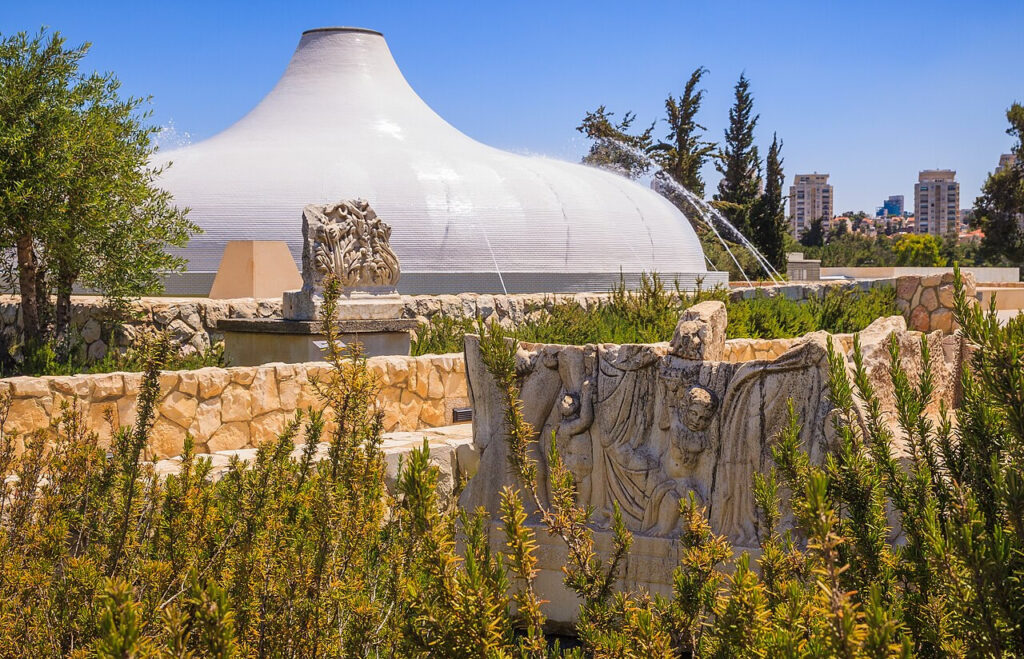Israel Museum
More than 5,000 years of cultural treasures are assembled around the vast Israel Museum’s indoor and outdoor galleries. Highlights are the titanic statues of the Archaeological Wing, while the Fine Arts Wing showcases 20th-century Israeli art from carpet weaving to sculpture. Newcomers to Jewish culture will appreciate the Rhythm of Life Room’s lavish displays on birth, marriage, and death ceremonies. The prize exhibit is the Dead Sea Scrolls, housed in a distinctive shrine among the world’s oldest biblical manuscripts.
Before starting your tour (dedicate at least half a day), pick up a complimentary audio guide from the visitor’s center. If you decide to spend a whole day – and many visitors do – the excellent Modern restaurant serves lunch. There are also two (cheaper) cafes on-site.
Shrine of the Book
The distinctive lid-shaped roof of this pavilion was designed to symbolize the pots in which the Dead Sea Scrolls were kept. The first scrolls (more than 900 total) were found in 1947 and date back to the Bar Kochba Revolt (132–35 CE). Dealing with secular and religious issues, they were thought to have been written by an ascetic group of Jews called the Essenes, who inhabited the area for about 300 years. The most important is the Great Isaiah Scroll, the most significant (7.3m) and best preserved – reproduced in facsimile at the museum. The exhibit tells the story of the scrolls and the Essenes and displays some original documents.
Archaeology Wing
Forming the most extensive collection of biblical and Holy Land archaeology in the world, the exhibits here are organized chronologically from prehistory to the Ottoman Empire. A group of 13th-century-BCE human-shaped clay coffins greets visitors in the first room, and other impressive displays include a 3rd-century mosaic floor from Nablus depicting events in the life of Achilles. Also notable is the ‘House of David’ Victory Stele, a fragmentary inscription from the First Temple period discovered at Tel Dan. This is the only contemporary, extra-biblical reference to the Davidic dynasty to have come to light thus far.
Jewish Art & Life Wing
The standout exhibits here are four complete synagogues brought from various locations and reconstructed. The 18th-century Vittorio Veneto Synagogue is adorned with gilt and plaster and was transported from Italy in 1965. The others are from Cochin, India; Paramaribo, Suriname; and Horb am Main, Germany. Also, it’s worth seeking out the painted Deller family sukkah (a temporary wooden dwelling erected during the harvest festival of Sukkot), which dates from the 19th century and was smuggled from Germany to Jerusalem in 1935. The rooms at the rear of the wing focus on Jewish costumes and jewelry.
Fine Arts Wing
The highlight here is the Impressionist and Post-Impressionist Gallery, which showcases work by Renoir, Pissarro, Degas, Sisley, Monet and Cézanne among many others. The Modern Art Gallery has works by Schiele, Rothko, Motherwell, Pollock, Modigliani and Bacon, and Israeli art is well represented in the Israeli Art pavilion, with striking paintings by Reuven Rubin and Yosef Zaritsky.
Art Garden
A paved promenade leads from the Shrine of the Book to this sprawling sculpture garden, which was designed by Japanese artist and landscape architect Isamu Noguchi and includes works by 19th-, 20th- and 21st-century artists including Moore, Kapoor, LeWitt, Oldenburg, Serra, Rodin and Picasso.

